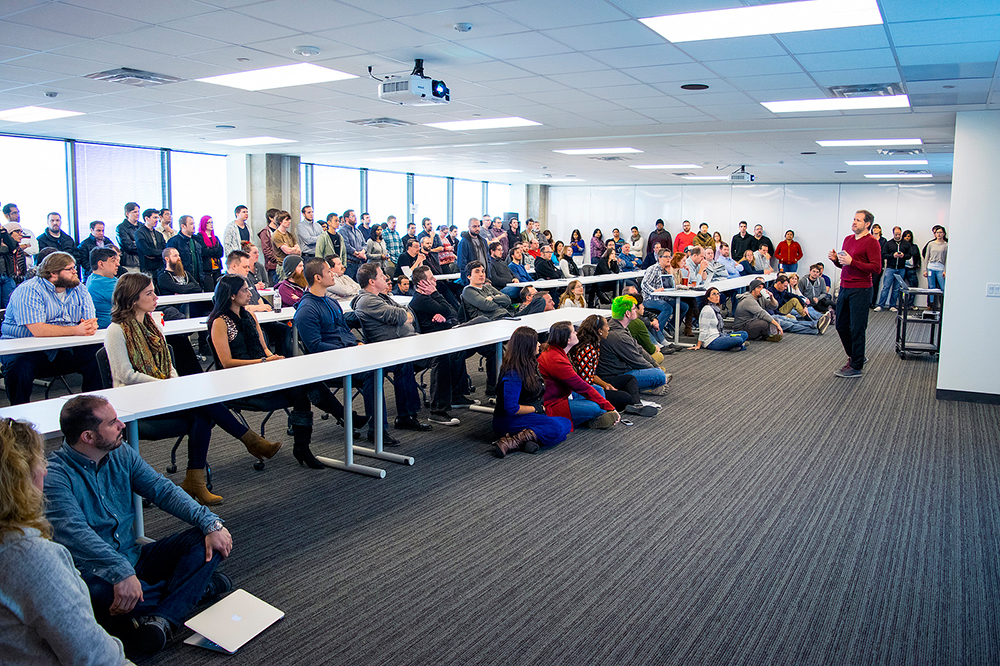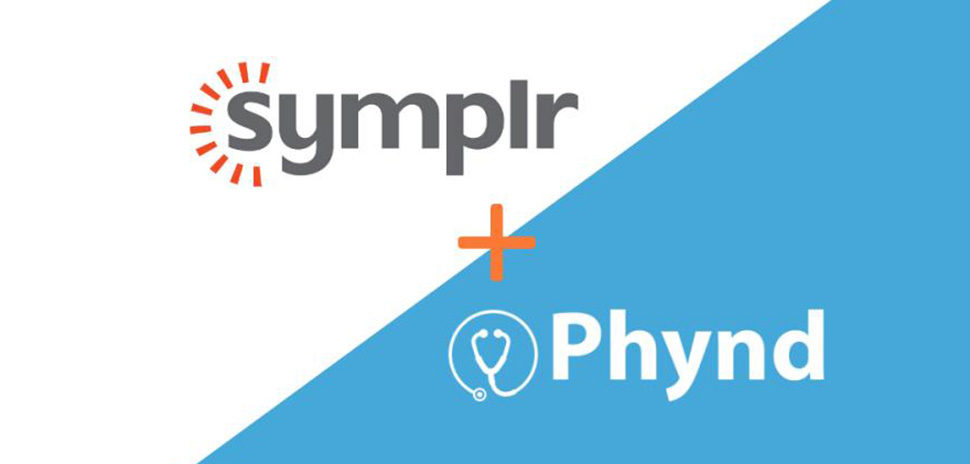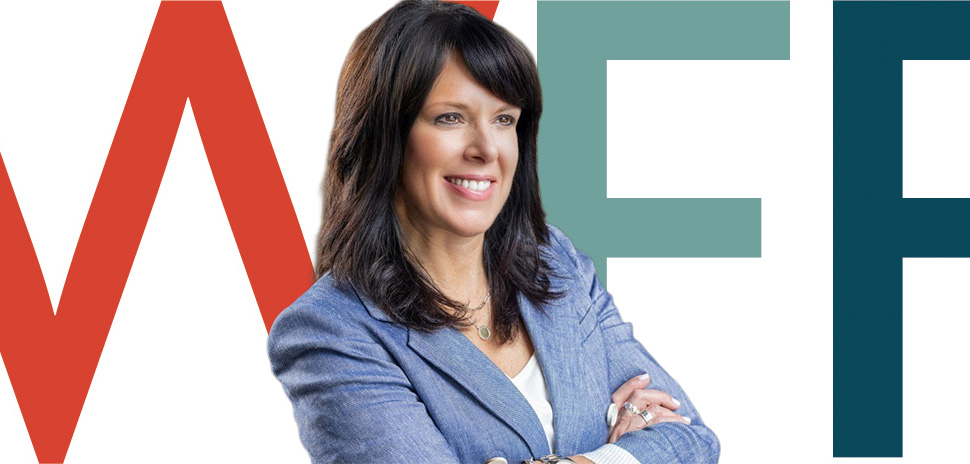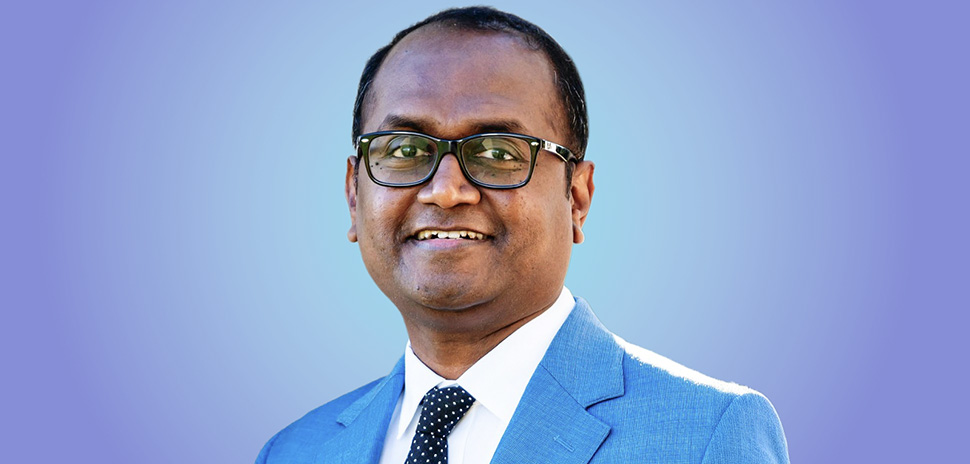In meetings and interviews with Dallas startup community, a common theme has emerged: the desire for more coverage around startups and growth stage companies that have landed “big exits”—sales, mergers, and acquisitions. We’ve answered that call and will be telling the stories of the DFW entrepreneurs and companies who’ve gone from idea to exit, and share their ideas on what it takes to be successful in this new series, Journeys to Exit.
In the span of roughly six years, Calvin Carter evolved from early adopter of the first generation iPhone, to self-taught app developer, to founder and CEO of Bottle Rocket—an award-winning mobile strategy, design, and development company—and then to the businessman who sailed his company into a squall-like acquisition by WPP, the world’s largest communications services group.
“Don’t let anything prevent you from doing the thing you love every day,” Calvin Carter says.
The secret to the Dallas-Fort Worth’s entrepreneur’s face-paced journey toward landing one of the biggest acquires to date for the city’s startup scene: “Don’t let anything prevent you from doing the thing you love every day,” Carter says.
Keep reading to learn about the Southern Methodist University graduate turned entrepreneur’s journey to acquisition, and for his ideas about what it takes to be an entrepreneur.
From iPhone to the Moon
On June 26, 2007, Calvin Carter stood on a small space of concrete as the sweltering mid-summer Texas began its initial decent into the dark. It was the night before the release of the first generation iPhone. Carter waited on his concrete corner outside of an Apple store through the night and until long after the sun broke dusk the following morning.
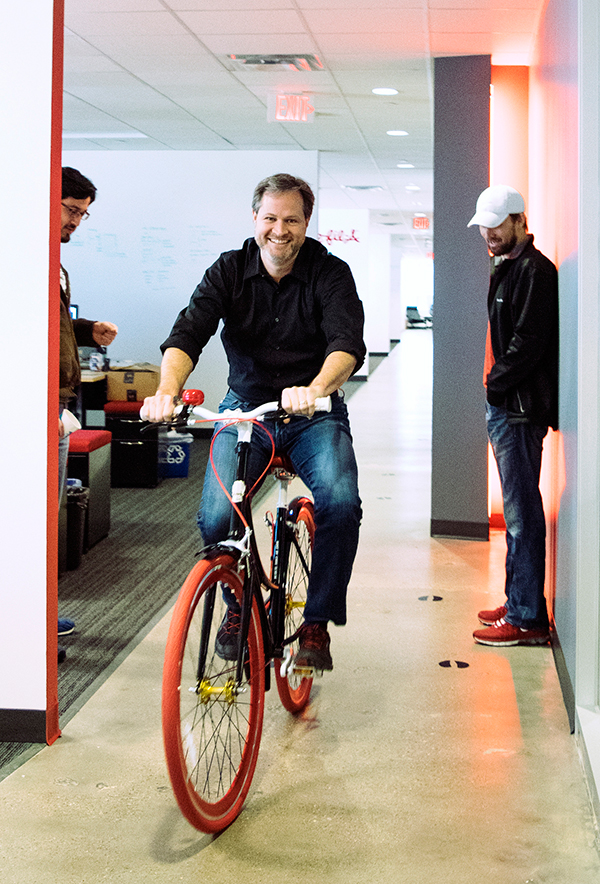
Calvin Carter testing out a new bike in the office. Photo courtesy Bottle Rocket.
As an early adopter, Carter was an immediate fan of the new technology. As a natural-born innovator whose passion was lit by an ever-burning entrepreneurial flame, Carter also quickly turned his focus to what could be.
“I had a predisposed interest in the iPhone and where it was going as a consumer device,” Carter says. “As an avid iPhone user, I wanted to be able to do so much more with it.”
Carter got his chance to do more with the still-emerging technology on March 6, 2008, as he watched Steve Jobs open the iPhone to third-party app developers in one of his most famous keynote addresses.
Prior to Jobs’ announcement, apps were either Apple made (Calendar, Weather, etc.), or were developed by businesses that would have to do one-off deals with the major phone carriers who would charge up to 70 percent in commission fees. It was anything but a free market space, but when Jobs opened the doors to his phone’s app factory, a whole new launching pad for entrepreneurs was formed.
“It was like we just opened the moon to real estate and mining, and whatever else. It was this amazing thing with all this potential,” Carter says.
Wanting to be among the first to arrive on Apple’s new moon, Carter launched Bottle Rocket the day after Jobs’ announcement. “It allowed a guy like me to get up the next morning and start a business from his home,” Carter says.
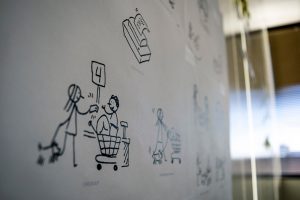 Carter spent the next several months working from home where he taught himself to create apps and sketched out potential new app designs on countless pieces of graph paper he purchased from Home Depot. “I sketched 30 to 35 app ideas within a period of months,” Carter says.
Carter spent the next several months working from home where he taught himself to create apps and sketched out potential new app designs on countless pieces of graph paper he purchased from Home Depot. “I sketched 30 to 35 app ideas within a period of months,” Carter says.
After developing his initial ideas for new apps, Carter did what a smart entrepreneur would do, and put together a team that would compliment his strengths and weaknesses to help bring Bottle Rocket’s first apps to the iPhone.
“I got on Craigslist to put together a band of eight to nine people to help get the first apps,” says Carter, whose resourcefulness should be noted considering he built his team in the age before new employees could be easily recruited with the click of a button on LinkedIn.
Embracing Failure Toward Acquisition
With the first Rocketeers—what Bottle Rocket calls its employees–assembled, the company created nine apps that ended up in the app store its first year. Only one of them produced a profit. However, Carter did not see Bottle Rocket’s batting 1-8 its first season as a setback.
“Failure is such an important part of our culture. When you fail, it’s when you know you’re trying something,” Carter says.
Carter and his team not only learned from but became better as a result of failure. Having nine apps in the iPhone store allowed the company to transition into building apps for clients.
Bottle Rocket landed its first client in 2009. That client was NPR—a game changer for the still-emerging company.
“Failure is such an important part of our culture. When you fail, it’s when you know you’re trying something,” Calvin Carter says.
“They were a difficult account to win. I competed against 11 other companies,” says Carter, who credits what some may perceive as failure with ultimately helping him get NPR as a client. “The apps turned out to be a great portfolio. Because I had done thousands of sketches, I could sketch their whole app. All of my failures along the way became my competitive advantage.”
In working with NPR, Bottle Rocket gained recognition, as well as an understanding of its own company values. “It set a standard that we are a very high-quality organization and set a precedence for all of the other work we do,” Carter says.
Led by that precedent, Bottle Rocket grew into a multi-million dollar business over the next few years, gaining major clients such as Coke and ABC News. And though Carter had been one of the first to land on Apple’s new moon, he and his team did not rest, and continued to pioneer onto yet uncharted frontiers.
“We would do whatever it took so that at the end of the day, we delivered a great product,” Carter says.
That tenacity led to Bottle Rockets’ being acquired by WPP in 2013. While financials surrounding the acquisition have not been disclosed, it’s safe to assume it was a big one, considering that WPP is the world’s largest communications services group with over 170,000 employees, more than 3,000 offices across 110 countries, and $16.5 billion in revenues.
Though Bottle Rocket was acquired, the company is still headquartered in Addison. And Carter and his team continue to push forward.
Carter was named Ernst & Young Entrepreneur of the Year in 2013. He has since grown his company to more than 180 Rocketeers, who have completed more than 180 iOS and Android apps. Bottle Rockets has won four Apple Hall of Fame awards for its apps, been named Entertainment App Developer of the Year by Variety, and has been listed twice on Inc.’s 500.
“We tend to look for opportunities and projects where we are being asked to do something that hasn’t been done before, so by definition we have to innovate,” Carter says
What It Takes To be a Successful Entrepreneur
Calvin Carter shares his thoughts on overcoming failure, building a team, and what he thinks are the most important ingredients for success.
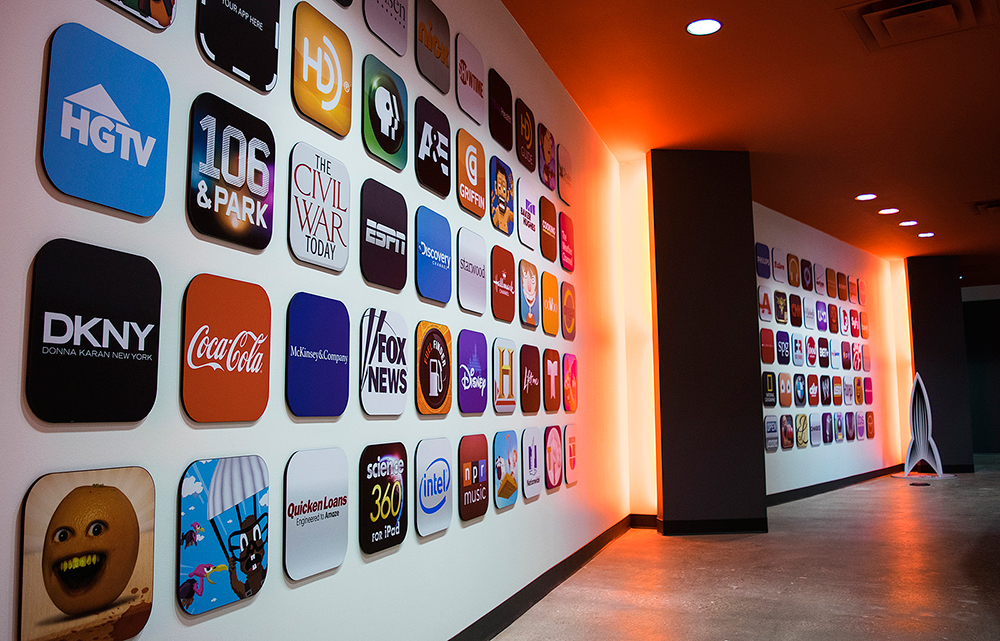
Walls in the office. Photo courtesy Bottle Rocket.
On Overcoming Failure
Failure—the idea of being comfortable failing—is such an important part of our culture at Bottle Rocket. Only one of the apps we launched in 2008 made money. All of my failures along the way became my competitive advantage.
When you fail, it’s when you know you’re trying something unique, and pushing yourself, and maybe even the industry to the next level. As long as you never give up, you never fail.
On Building a Team
Before you ask others to join your company, you need to know you are fully committed to whatever it is you are doing. When you are the right person in the right area, you don’t ask questions, you just do it. Until you know you’ve got it or you are the person to do it, it’s unfair to ask others to join you. Be who you are and do what you are comfortable with. If you are really committed, than you’ll do it for love of the game, and that means you are willing to do it when it’s fun, or not fun.
We are a values-driven company. We hire people who believe in and lean into our values. They have a thirst for the things that create innovation.
(After the article, check out the video on Bottle Rocket’s Fourth Annual Rocket Science 2015 for a glimpse into one of the company’s formal innovation programs that promote the continuous development of its team).
On the Most Important Ingredients for Success
This gets a little warm and fuzzy, but I really do believe the greatest competitive advantage is your love and your passion.
At the center of all of things that I know of to be successful, is that there was someone somewhere who really loved something deeply. Don’t let someone who’s trying to sell a book tell you how to do what you love. Don’t let anything prevent you from doing the thing you love every day.
Final Thoughts
If you keep focusing on the thing you love every day, you’re going to be successful. Don’t forget why you did this work in the first place.

